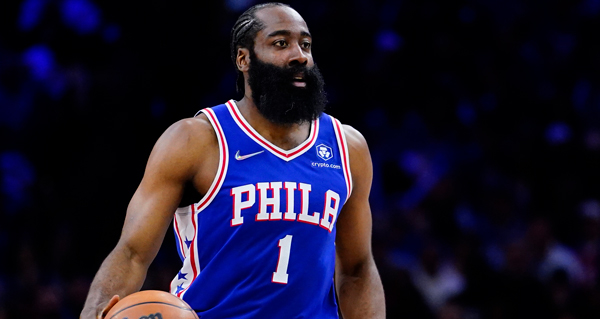On Thursday night, as the Philadelphia 76ers were eliminated by the Miami Heat, James Harden was the team's fifth leading scorer. He attempted only nine shots and, with seven of those being three-pointers, failed to attack the paint. Consequently, he did not attempt a single free throw. In a vacuum, it was strange. Why would one of the best scorers in NBA history willingly take a step back and not be more aggressive in an elimination game? Of course, if you’ve watched Harden throughout his career, it was less strange. We have seen this before.
For many years, Harden has been given free rein to run the offense as he sees fit, yet he has repeatedly run headfirst into the limits of his own style in the postseason. There’s a reason that most teams don’t rely so heavily on one player’s skill set, after all. Opponents hone in on them, finding ways to stymie them over the course of an extended series that are not possible when a team is more focused on establishing a singular style that can carry them throughout an 82 game season. This is not news, and yet, we find ourselves having the same conversation again anyway.
What does James Harden need? Over the course of his career, he has played with many of the best players of this era, having teamed up with Dwight Howard, Kevin Durant, Russell Westbrook, Chris Paul, Kyrie Irving, and now Joel Embiid. Yet none of these pairings have ever been quite enough to win it all. One can say that it makes sense that none of Harden’s teams ever won a championship because, for example, those Rockets squads weren’t ever better than those Warriors teams they kept running up against – or that the 2012 Thunder weren’t as good as the Heat or that the 2021 Bucks were just better than the Nets. I think that all those statements are true, but at what point do they become a tautology?
There is a new urgency to these questions about Harden and what comes next. He has wrapped up his 13th NBA season. He is no longer a young man and a new contingent of stars is taking the place of their forebears. Now, it seems evident that if he is ever going to win a championship, it will not be with him as the team’s centerpiece. I remember watching Harden not too long ago, watching him score an easy bucket after fooling a defender, driving past them, and stepping past a confused help defender on his way to the hoop. It was something I’d seen him do innumerable times before and I recall thinking to myself that it felt like he could do this forever. But this was before his hamstring and a handful of other minor injuries started bothering him and it became clear that he could not.
While Harden has never been a stereotypically athletic player the way the word normally connotes, his ability to start and stop unexpectedly, to change speeds and control his body has always been unbelievable. Now, those abilities appear to be waning. There are still nights when the step-back is falling and he’s able to create separation off the dribble while also finding open teammates, but they are becoming less frequent.
Thankfully for the Sixers, with Joel Embiid on the roster, they do not need Harden to be the team’s singular focus. Indeed, even if Harden continues to regress, it is easy enough to imagine the Sixers improving next year. Daryl Morey could work to add some depth this offseason; Tyrese Maxey could continue his journey towards stardom; the coaching staff could figure out more creative ways to help Embiid and Harden bring out the best in each other. Even better would be if they got a new coaching staff altogether. There are avenues to maximizing Joel Embiid’s generational talent, becoming a true contender, and getting out of the second round for the first time in over two decades. But if Harden remains at the center of it all, would such changes matter?
There comes a point when, after enough failings in enough unique situations, one is no longer able to place all the blame on their context. Looking back, it becomes clear that while the fault may still not be exclusively their own, that they are still playing a role in these disappointments. I do not want to say that these collapses are what define Harden’s career, but they must say at least something about him. They may not be the sole lens through which to view his achievements. Regardless, they do cast a distinctive color upon everything else.
For nearly a decade, James Harden functioned as a one man offense, defining the shape of any game he played in. While he can still be that, as his tremendous fourth quarter in Game 4 of the Conference Semifinals showed, such performances are bound to become rarer in future seasons. It may not be by choice, but finally, he will be forced to face the limits of his own world-building and attempt something else. Harden has long been the cosmos itself; what will it look like for him to be just another individual residing in a world he cannot fully shape?



